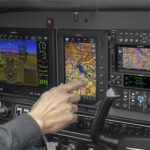Hanwha Aerospace rolled out its 10,000th military engine on April 15, achieving a major milestone for its indigenous development and manufacturing of aero engines.
A ceremony was held at the Changwon Plant I to commemorate the rollout of the 10,000th aircraft engine, the F404 powering the TA-50 trainer jet flown by the ROK Air Force. The milestone was achieved 45 years after the company had produced a J79 Turbojet engine for the F-4 Phantom II in 1978.
Among the high-profile guests at the ceremony were Gen. Lee Young-soo, ROK Air Force Chief of Staff; Minister Seok Jong-gun of Defense Acquisition Program Administration; Park Jong-seung, President of the Agency for Defense Development.
In a congratulatory message through a video speech, Minister of National Defence Shin Won-shik recognised the importance of the country’s aero engine manufacturing capabilities.
“The aviation engine embodies a concentration of advanced technologies, making it a key determinant of aerospace industry leadership. Furthermore, Hanwha’s technology is expected to play an important role in strengthening the Republic of Korea’s defense capabilities.” said the minister.
On the occasion of the engine production milestone, Hanwha Aerospace broke the ground for a 16,530㎡ engine production facility, in which F414 engines for the fleet of KF-21 fighter aircraft to be manufactured under the license from General Electric. About USD 30 million was invested to build the facility featuring smart technologies of IT-based quality management and logistics systems.
As part of efforts to enhance its own engine capabilities, Hanwha Aerospace is aiming to develop a homegrown turbojet engine generating 15,000 lbs of thrust, which can power the KF-21 Block III variant and unmanned fighter aircraft, by the mid-2030s. Furthermore, the company will continue to develop core technologies for a 6th-generation jet fighter, such as the Embedded Electric Starter Generator (E2SG), and ceramic matrix composite materials.
“Hanwha Aerospace is fully committed to investing in the research and development of indigenous, advanced aero engines, instead of relying on foreign technology, to contribute to the growth of South Korea’s aerospace industry, and enhancing the national security posture as well,” said Jaeil Son, President and CEO of Hanwha Aerospace.
Subscribe to the FINN weekly newsletter

